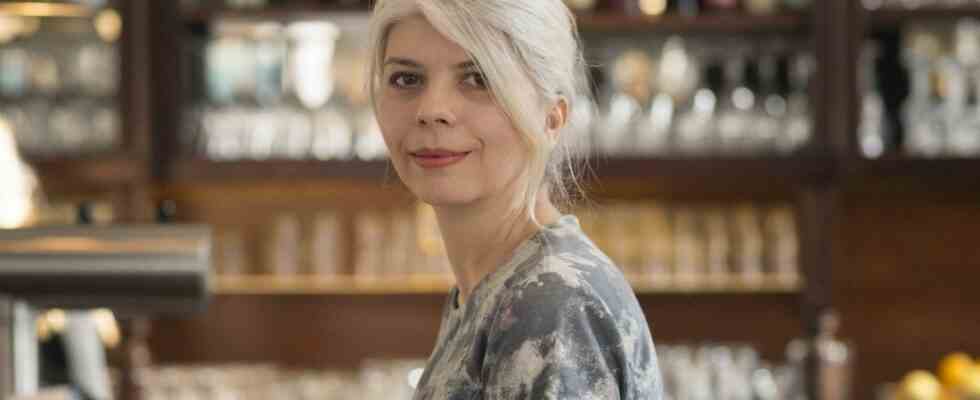Walking and thinking have been connected since the Greek Peripatetics. The one between wandering and thinking is more recent. Fleeing and thinking, on the other hand, almost contradict each other. This book moves in the field of tension between these poles: with an open mind for landscapes, reading memories and her own feelings, the essayist, poetry and novelist Marica Bodrožić has once again paced the last stage of Walter Benjamin’s escape route in 1940 across the Pyrenees. Such an undertaking is tailor-made for the author, who has become known for her mental images and dazzling conceptual poetry.
Thinking about persecution, imprisonment, resistance, exile comes to her in the rhythm of inhaling and exhaling, on the sometimes difficult, sometimes gratifying ascent over the Pyrenees path. Reflections on the historical scars of fascism and Stalinism alternate. Depressed, Bodrožić notes how traditional magical worlds are being pushed aside by narcissistic modern instant communication. She thinks anxiously of the delights of the late capitalist oversupply and calms down in the face of the beguilingly beautiful preserved landscapes from Banyuls-sur-Mer to Portbou in northern Spain.
There are also short fragments of quotations from CG Jung, Simone Weil, Adorno, Bataille and Toni Morrison
As a reader, you take one or the other of them with you, sometimes pausing, passing others heedlessly and sometimes speeding up as if crossing a stretch of land that doesn’t appeal to us personally. Everyone has to make their own way through the terrain of these soul shorthands of associations, quotations and historical speculation.
Because everything that the author perceives when she is “speaking inward” on the way that she is working towards has become a language for her “that refuses periods, commas and semicolons” and that, in chapters without paragraphs, wraps the thoughts in airy loops, as if drawn in the sky by the omnipresent birds while hiking, without a message. Thus, writes the author, “the one-dimensional and possessive self has lost its hold” and allows for “a broader, more generous self” to be expressed. A self that descends into philosophical and psychoanalytic depths.
In Portbou on the Costa Brava in Spain, this monument by Dani Karavan commemorates Walter Benjamin and other victims of National Socialism.
(Photo: Reinhard Koester/picture-alliance)
In some places, this flow of associations may become obscure. Most of the time, however, thanks to the constant change of subject, each with only short fragments of quotations from Daniil Charms, Ossip Mandelstam, CG Jung, Simone Weil, TW Adorno, Georges Bataille, Toni Morrison and of course Walter Benjamin, a trail quickly leads back to the clearer light of reflection. Survival logs by Pawel Florenski and Karlo Štajner from Soviet imprisonment, Parisian philosopher Sarah Kofman’s never overcome memory of her father’s abduction by the Nazis and the author’s own reminiscences from her childhood years in the socialist isolation of the Dalmatian mountain slopes alternate with one another. Palm trees rise up from the landscape as witnesses of the saint and the shepherds who passed by the house of Bodrožić’s childhood surrounded by herds of animals become biblical figures of “archaic stillness”. All of this is loosely but stimulatingly connected through the confrontation with Benjamin’s gang up the Pyrenees in September 1940.
Thinking is done here in clear images and words, without vague vagueness
Marica Bodrožić relies primarily on the memories of refugee helpers Lisa and Hans Fittko. The sentence “You know, this briefcase is the most important thing for me”, which Benjamin is said to have said during the ascent, suddenly seems “somehow crooked” to the author when rereading it, “somehow you can’t say it with your voice”, more like a subsequent entry from the Memory. And even the guaranteed facts of Benjamin’s last walk and suicide seem dubious to her.
However, the book is by no means about clarifying historical facts, but about reflecting on the reality and mystery of a “spiritual” time in which the present and the future merge. The author investigates this based on the chapter “A Ghost” from “Berlin Childhood around Nineteen Hundred”. She reads this chapter convincingly as an example of a foretold future and interprets it in the mirror of history’s backward-looking angel, whom Benjamin recognized in Paul Klee’s drawing “Angelus Novus”.
Marica Bodrožić: The work of the birds. soul shorthand. Luchterhand, Munich, 2022. 348 pages. 22 euros.
What distinguishes Marica Bodrožić among contemporary thinkers is that she is not catastrophically addicted to past and present dramas. Even above the memory of genocide, wars and dictatorships, another dimension of time shines in her, which allows a “messianic intensification of the living in the midst of the hostile to life”. It may have seemed like salvation to those fleeing around 1940 on the Col de Rumpissa when crossing the border into Spain, even if their fate ended tragically, as in the case of Benjamin. On the other hand, this attitude is disregarded “by the empty-hearted, who bring their regulations, their new laws, their deadly word machines into the field”.
She was born under socialism, but never became a person oriented towards ideological struggle, writes the author. She remained receptive to the presence of the holy and to the effect of grace – a word that recurs frequently in her book. To be able to speak of such things with clear images and words, without digressing into vague vagueness, but against the background of a concrete historical situation, is a credit. It makes this book unique and lasts.

